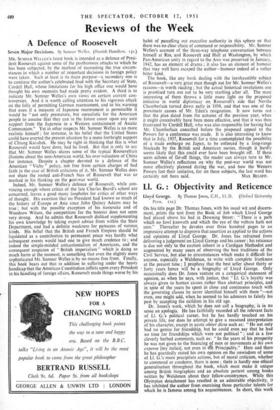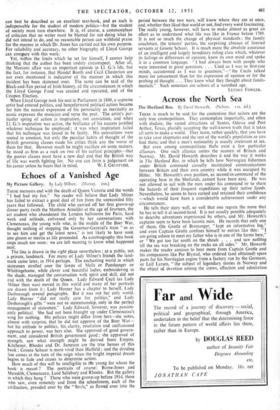Li. G.: Objectivity and Reticence Lloyd George. By Thomas Jones,
C.H., LL.D. (Oxford University Press. 2 r s.) ON his title page Dr. Thomas Jones, with his usual wit and discern- ment, prints the text from the Book of Job which Lloyd George had placed above his bed in Downing Street : " There is a path which no fowl knoweth and which the eye of the vulture bath not seen." Thereafter he devotes over three hundred pages to an impressive attempt to disprove that assertion as applied to the actions and opinions of Lloyd George. Dr. Jones has refrained from delivering a judgement on Lloyd George and his career ; his reticence is due not only tp the caution inborn in a Cardigan Methodist and augmented by many years of observing the best traditions of the Civil Service, but also to circumstances which make it difficult for anyone, especially a Welshman, to write with complete frankness at the present time ; I prophesy that the best seller about thirty or forty years hence will be a biography of Lloyd George. Only occasionally does Dr. Jones venture on a categorical statement of opinion, as when he says, with justice, that " LI. G.'s loyalty was always given to human causes rather than abstract principles, and in spite of the years he spent in close and continuous touch with the governing classes he never identified himself with them "—not even, one might add, when he seemed to his admirers to falsify his past by accepting the earldom in his old age. Dr. Jones's work, which he does not call a biography; is in no sense an apologia. He has faithfully recorded all the relevant facts of Ll. G.'s political career, but he has hardly touched on his private life, nor does he attempt to give a reasoned interpretation of his character, except in acute obiter dicta such as: " He not only had no genius for friendship, but he could even say that he had no time for friendships which were not political " ; and in a few cleverly barbed comments, such as: " In the years of his prosperity he was not given to the financing of men or movements at his own expense [my italics], not even in the Principality." Here and there he has guardedly stated his own opinion on the unwisdom of some of LI. G.'s more precipitate actions, but of moral criticism, whether to commend or condemn, there is none ; there is hardly one ethical generalisation throughout the book, which must make it unique among British biographies and an absolute portent among books written by Welshmen about their fellow-countrymen. While this Olympian detachment has resulted in an admirable objectivity, it has inhibited the author from exercising those particular talents for which he is famous among his acquaintances. In short, this work can best be described as an excellent text-book, and as such is indispensable for the student of modern politics—but the student of society must turn elsewhere. It is, of course, a commonplace of criticism that no writer must be blamed for not doing what he did not intend to do, and no reasonable person can withhold praise for the manner.in which Dr. Jones has carried out his own purpose. For reliability and accuracy, no other biography of Lloyd George can compare with this work:-
Yet, within the limits which he set for himself, I cannot help thinking that the author has been unduly circumspect. After all, the Marconi affair was an important episode in LI. G.'s life, but the fact, for instance, that Handel Booth and Cecil Chesterton are not even mentioned is indicative' of the manner in which this incident has been skimmed over. The same can be said of the Black-and-Tan period of Irish history, of the circumstances in which the Lloyd George Fund was created and operated, and of the Coupon Election.
When Lloyd George took his seat in Parliament in 1890, a supreme artist had entered politics, and henceforward political action became for him the natural expression of his personality as inevitably as music expresses the musician and verse the poet. The artist's par- ticular spring of action ,is inspiration, not conviction, and when LI. G.'s inspiration was active, the brilliance of his success justified whatever technique he employed ; it was when inspiration failed that his technique was found to be faulty. His convictions were rooted in emotion, but only the peculiar habits of thought of the British governing classes made his critics think any the worse of them for that. However much he might vacillate on some matters, he stood as firm as a rock on two of his earliest principles—that the poorer classes must have" a new deal and that the British way of life was worth fighting for. No one can form a judgement on his career unless he bears that in mind. W. J. GRUFFYDD.



































 Previous page
Previous page